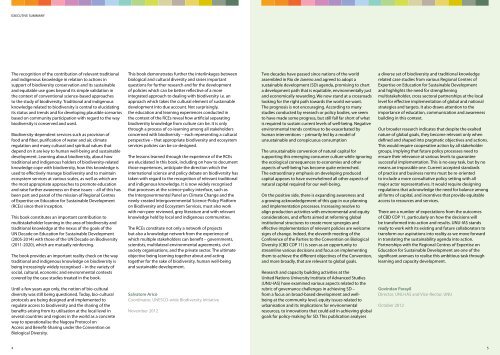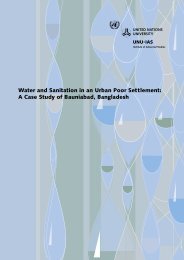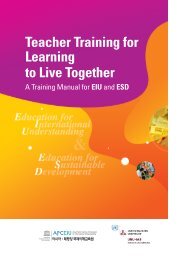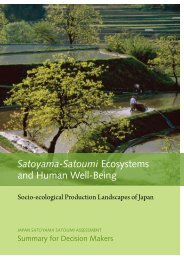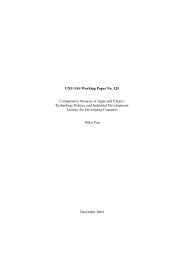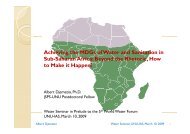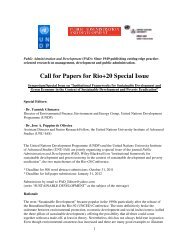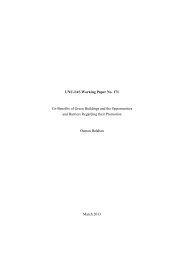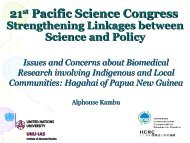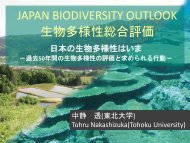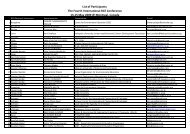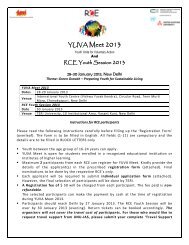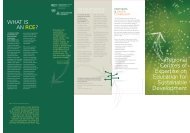TradiTional Knowledge and BiodiversiTy - UNU-IAS - United ...
TradiTional Knowledge and BiodiversiTy - UNU-IAS - United ...
TradiTional Knowledge and BiodiversiTy - UNU-IAS - United ...
You also want an ePaper? Increase the reach of your titles
YUMPU automatically turns print PDFs into web optimized ePapers that Google loves.
executive summary<br />
The recognition of the contribution of relevant traditional<br />
<strong>and</strong> indigenous knowledge in relation to actions in<br />
support of biodiversity conservation <strong>and</strong> its sustainable<br />
<strong>and</strong> equitable use goes beyond its simple validation in<br />
the context of conventional science-based approaches<br />
to the study of biodiversity. Traditional <strong>and</strong> indigenous<br />
knowledge related to biodiversity is central to elucidating<br />
its status <strong>and</strong> trends <strong>and</strong> for developing plausible scenarios<br />
based on community participation with regard to the way<br />
biodiversity is conserved <strong>and</strong> used.<br />
Biodiversity-dependent services such as provision of<br />
food <strong>and</strong> fiber, purification of water <strong>and</strong> air, climate<br />
regulation <strong>and</strong> many cultural <strong>and</strong> spiritual values that<br />
depend on it are key to human well-being <strong>and</strong> sustainable<br />
development. Learning about biodiversity, about how<br />
traditional <strong>and</strong> indigenous holders of biodiversity-related<br />
knowledge cope with biodiversity, how this knowledge is<br />
used to effectively manage biodiversity <strong>and</strong> to maintain<br />
ecosystem services at various scales, as well as which are<br />
the most appropriate approaches to promote education<br />
<strong>and</strong> raise further awareness on these issues – all of this has<br />
been part <strong>and</strong> parcel of the mission of Regional Centres<br />
of Expertise on Education for Sustainable Development<br />
(RCEs) since their inception.<br />
This book constitutes an important contribution to<br />
multistakeholder learning in the area of biodiversity <strong>and</strong><br />
traditional knowledge at the nexus of the goals of the<br />
UN Decade on Education for Sustainable Development<br />
(2005-2014) with those of the UN Decade on Biodiversity<br />
(2011-2020), which are mutually reinforcing.<br />
The book provides an important reality check on the way<br />
traditional <strong>and</strong> indigenous knowledge on biodiversity is<br />
being increasingly widely recognised – in the variety of<br />
social, cultural, economic <strong>and</strong> environmental contexts<br />
covered by the case studies treated in the book.<br />
Until a few years ago only, the notion of bio-cultural<br />
diversity was still being questioned. Today, bio-cultural<br />
protocols are being designed <strong>and</strong> implemented to<br />
regulate access to biodiversity <strong>and</strong> the sharing of the<br />
benefits arising from its utilisation at the local level in<br />
several countries <strong>and</strong> regions in the world as a concrete<br />
way to operationalise the Nagoya Protocol on<br />
Access <strong>and</strong> Benefit-Sharing under the Convention on<br />
Biological Diversity.<br />
This book demonstrates further the interlinkages between<br />
biological <strong>and</strong> cultural diversity <strong>and</strong> raises important<br />
questions for further research <strong>and</strong> for the development<br />
of policies which can be better reflective of a more<br />
integrated approach to dealing with biodiversity i.e. an<br />
approach which takes the cultural element of sustainable<br />
development into due account. Not surprisingly,<br />
the education <strong>and</strong> learning experiences conducted in<br />
the context of the RCEs reveal how artificial separating<br />
biodiversity knowledge from culture can be. It is only<br />
through a process of co-learning among all stakeholders<br />
concerned with biodiversity – each representing a cultural<br />
perspective – that appropriate biodiversity <strong>and</strong> ecosystem<br />
services policies can be co-designed.<br />
The lessons learned through the experience of the RCEs<br />
are elucidated in this book, including on how to document<br />
those experiences, anticipate the direction which the<br />
international science <strong>and</strong> policy debate on biodiversity has<br />
taken with regard to the recognition of relevant traditional<br />
<strong>and</strong> indigenous knowledge. It is now widely recognised<br />
that processes at the science-policy interface, such as<br />
the Intergovernmental Panel on Climate Change <strong>and</strong> the<br />
newly-created Intergovernmental Science-Policy Platform<br />
on Biodiversity <strong>and</strong> Ecosystem Services, must also work<br />
with non-peer reviewed, grey literature <strong>and</strong> with relevant<br />
knowledge held by local <strong>and</strong> indigenous communities.<br />
The RCEs constitute not only a network of projects<br />
but also a knowledge network from the experience of<br />
which multiple stakeholders can benefit – governments,<br />
scientists, multilateral environmental agreements, civil<br />
society organisations, <strong>and</strong> the private sector. The ultimate<br />
objective being learning together about <strong>and</strong> acting<br />
together for the sake of biodiversity, human well-being<br />
<strong>and</strong> sustainable development.<br />
Salvatore Aricò<br />
Coordinator, UNESCO-wide Biodiversity Initiative<br />
November 2012<br />
Two decades have passed since nations of the world<br />
assembled in Rio de Janeiro <strong>and</strong> agreed to adopt a<br />
sustainable development (SD) agenda, promising to chart<br />
a development path that is equitable, environmentally just<br />
<strong>and</strong> economically rewarding. We now st<strong>and</strong> at a crossroads<br />
looking for the right path towards the world we want.<br />
The prognosis is not encouraging. According to many<br />
studies conducted by research or policy bodies, we seem<br />
to have made some progress, but still fall far short of what<br />
is required to sustain current levels of well-being. Negative<br />
environmental trends continue to be exacerbated by<br />
human interventions – primarily led by a model of<br />
unsustainable <strong>and</strong> conspicuous consumption<br />
The unsustainable conversion of natural capital for<br />
supporting this emerging consumer culture while ignoring<br />
the ecological consequences to economies <strong>and</strong> other<br />
aspects of well-being has become quite entrenched.<br />
The extraordinary emphasis on developing produced<br />
capital appears to have overwhelmed all other aspects of<br />
natural capital required for our well-being.<br />
On the positive side, there is exp<strong>and</strong>ing awareness <strong>and</strong><br />
a growing acknowledgement of this gap in our planning<br />
<strong>and</strong> implementation processes. Increasing resolve to<br />
align production activities with environmental <strong>and</strong> equity<br />
considerations, <strong>and</strong> efforts aimed at reforming global<br />
institutional structures to create more synergies <strong>and</strong><br />
effective implementation of relevant policies are welcome<br />
signs of change. Indeed, the eleventh meeting of the<br />
Conference of the Parties to the Convention on Biological<br />
Diversity (CBD COP 11) is seen as an opportunity to<br />
streamline various decisions <strong>and</strong> focus on implementing<br />
them to achieve the different objectives of the Convention,<br />
<strong>and</strong> more broadly, that are relevant to global goals.<br />
Research <strong>and</strong> capacity building activities at the<br />
<strong>United</strong> Nations University Institute of Advanced Studies<br />
(<strong>UNU</strong>-<strong>IAS</strong>) have examined various aspects related to the<br />
rubric of governance challenges in achieving SD –<br />
from a focus on broad-based development <strong>and</strong> wellbeing<br />
at the community level, equity issues related to<br />
urbanisation <strong>and</strong> its implications for environmental<br />
resources, to innovations that could aid in achieving global<br />
goals for policy-making for SD. This publication analyses<br />
a diverse set of biodiversity <strong>and</strong> traditional knowledge<br />
related case studies from various Regional Centres of<br />
Expertise on Education for Sustainable Development<br />
<strong>and</strong> highlights the need for strengthening<br />
multistakeholder, cross sectoral partnerships at the local<br />
level for effective implementation of global <strong>and</strong> national<br />
strategies <strong>and</strong> targets. It also draws attention to the<br />
importance of education, communication <strong>and</strong> awareness<br />
building in this context.<br />
Our broader research indicates that despite the exalted<br />
nature of global goals, they become relevant only when<br />
defined <strong>and</strong> shaped into pragmatic objectives <strong>and</strong> actions.<br />
This would require cooperative action by all stakeholder<br />
groups, implying that future policy processes need to<br />
ensure their relevance at various levels to guarantee<br />
successful implementation. This is no easy task, but by no<br />
means an impossible one. Current accepted st<strong>and</strong>ards<br />
of practice <strong>and</strong> business norms must be re-oriented<br />
to include a more consultative policy setting with all<br />
major actor representatives. It would require designing<br />
regulations that acknowledge the need for balance among<br />
all forms of capital, <strong>and</strong> incentives that provide equitable<br />
access to resources <strong>and</strong> services.<br />
There are a number of expectations from the outcomes<br />
of CBD COP 11, particularly on how the decisions will<br />
be transformed into action <strong>and</strong> results. <strong>UNU</strong>-<strong>IAS</strong> st<strong>and</strong>s<br />
ready to work with its existing <strong>and</strong> future collaborators to<br />
transform our aspirations into reality as we move forward<br />
in translating the sustainability agenda into action.<br />
Partnerships with the Regional Centres of Expertise on<br />
Education for Sustainable Development are one of the<br />
significant avenues to realise this ambitious task through<br />
learning <strong>and</strong> capacity development.<br />
Govindan Parayil<br />
Director, <strong>UNU</strong>-<strong>IAS</strong> <strong>and</strong> Vice-Rector, <strong>UNU</strong><br />
October 2012<br />
4<br />
5


